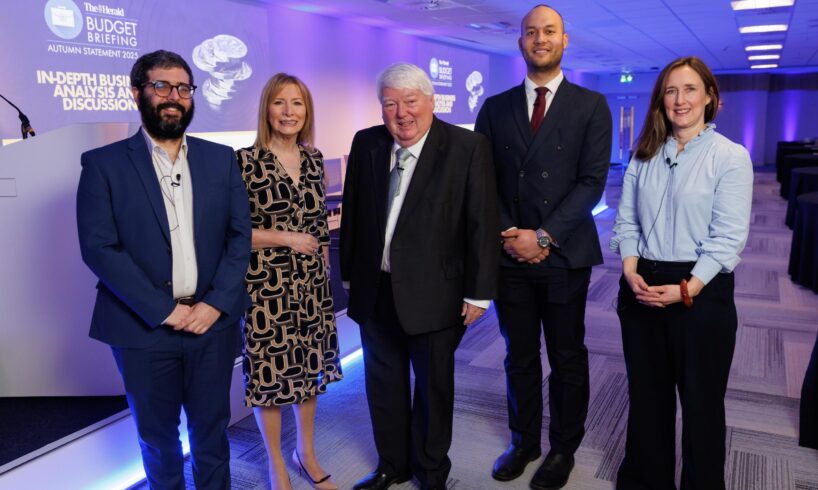
A Budget with far less chaos than billed but big tax moves
In case you missed it, in a relentless onslaught that came across at times as a personal attack on Ms Reeves, the Opposition leader declared the Chancellor the “worst ever” and called for her resignation, providing yet more drama to a Budget that has been described as “chaotic” and “unprecedented” – but not for its content, to be clear.
At The Herald’s Budget Briefing in the SEC Glasgow, chairman Brian Taylor, Herald columnist and veteran political commentator, expertly unpicked the key points with the help of a distinguished panel: Adam Pearce, director, Minerva Innovation Group; Zoe Graham, head of financial risk solutions, Virgin Money; Michelle Ferguson, CBI director – Scotland, and João Sousa, deputy director, University of Strathclyde, Fraser of Allander Institute.
The CBI’s Ms Ferguson, whose phone usually “rings off the hook” after a Budget as members of the business organisation ask for guidance on the implications of some of the measures announced, said: “I think it was a relief for many. We’d been saying to the Treasury ‘look, you can’t keep coming back for more’.
Budget 2025: OBR apologises after leak of government’s plans
“The rise in employer national insurance contributions announced last year is still a big problem for businesses across the UK, particularly SMEs. So, there is stalling investment and stalling recruitment, and that is not good for the economy. We need to push for the growth the UK economy so desperately needs.”
In spite of the OBR faux pas, the reaction to the Chancellor’s Budget was “calm and composed – probably because much of its content had been expected”, said Ms Graham of Virgin Money, one of the Budget Briefing’s sponsors.
However, commenting on Ms Reeves’s “smorgasbord” of small measures supplementing a freeze in income tax thresholds for a further three years, she was in agreement with Ms Ferguson, noting: “There are taxes that will have cost implications for employers already struggling with the last hits.”
Meanwhile, Fraser of Allander’s João Sousa commented: “Freezing thresholds is actually a pretty regressive way of raising taxes.”
And on the Chancellor’s tax increases which raise the government’s fiscal headroom to £21.7 billion and fund spending to bring down the cost of living, Fraser of Allander’s João Sousa suggested this was “a bit of a fiction”, adding: “There is another fiscal event in March so we can expect more of this malarkey.”
He noted: “The fact that the headroom has doubled is not as clear-cut as it seems because there will be more tax rises.”
For former professional basketball player Adam Pearce, this week’s Budget felt like “an attempt to get a bigger slice of an ever-decreasing pie”. He said: “There was not much cutting of red tape to make things easier for business.”
How tax changes and frozen thresholds will affect Scotland
The director of Minerva Innovation Group, a sponsor of the event which specialises in sourcing R&D tax relief, pointed to the benefits available in Ireland, long seen as a country that is more favourable to inward investors. He said that clients of Minerva, such as those in veterinary medicine, need more incentives to start and grow businesses.
“When you consider that 96% of businesses in the UK are SMEs with 10 or fewer employees – surely we need to make it easier for them.”
He also discussed the not unexpected announcement that the National Living Wage and National Minimum Wage will increase from April 1, 2026. “It’s great news for employees, particularly young people, but firms then need to look at increasing other salaries too and this can cost tens of thousands of pounds.”
The CBI’s Ms Ferguson agreed, adding: “Investing in staff helps retain them and boosts productivity. The businesses we work with value their workforce, but rises in the national minimum wage, additional costs like NICs, and increasing pay differentials all put pressure on them, in particular SMEs.”
This is how UK Budget affects Scotland – and your money
Pension concerns were also raised after the Chancellor announced a £2,000-a-year cap on the amount that can be put into pensions through the salary sacrifice scheme from April 2029. “There is a pensions problem – people have not saved enough,” said CBI’s Ms Ferguson.
Regarding saving more generally, Fraser of Allander’s Mr Sousa pointed to the “paradox of thrift”, introduced by John Maynard Keynes, which suggests that while people should save, this can negatively impact the economy as individuals spend less. “However, we do want to encourage some risk-taking.”
Virgin Money’s Ms Graham agreed, noting: “We are certainly seeing really strong and resilient household savings but what is missing is consumer confidence which in turn means that, on the business side, demand is falling.”
Another point for discussion was confirmation that the UK Government’s windfall tax on North Sea oil and gas producers will remain in place until 2030 – a decision industry leaders warn will cost thousands of jobs damage Scotland’s energy sector. Scrapping or reforming the EPL was a key ask from the sector ahead of the Budget.
At the CBI, the mantra is “investment, investment, investment”, noted Michelle Ferguson. “There should have been a growth and investment plan but there was not. We must now push for that and EPL should be considered. Energy is important to our economy and jobs in north-east Scotland in particular.”
However, she conceded that, following this week’s Budget, businesses now have “much more certainty for the next year and that is what we need down the line”.
Scotch whisky bosses at odds with Labour over tax hike
Mr Sousa, meanwhile, commented: “They managed to get through it without shocking anyone too much.”
Finally, Minerva Innovation Group’s Adam Pearce said: “I think it’s really been a short-term, placeholder sticking plaster with long-term objectives but no long-term delivery of policy.”
The Herald Budget Briefing was sponsored by Minerva Innovation Group, Virgin Money, LOCALiQ.





